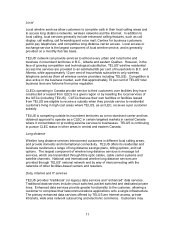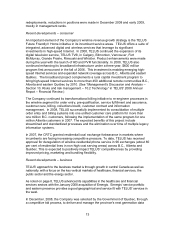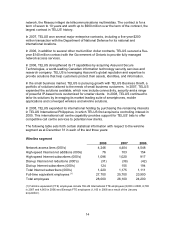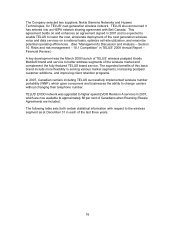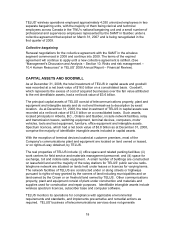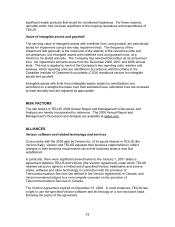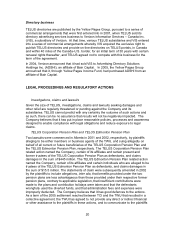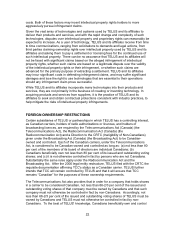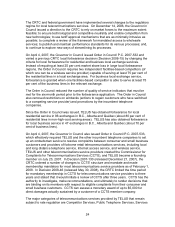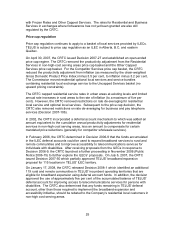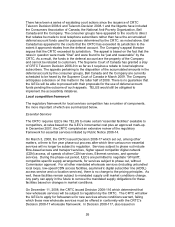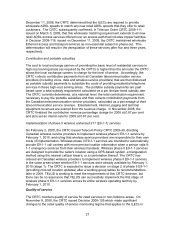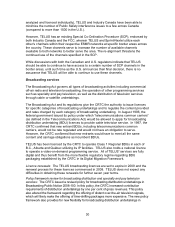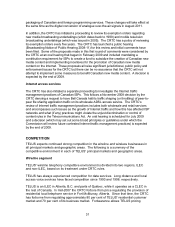Telus 2008 Annual Report Download - page 21
Download and view the complete annual report
Please find page 21 of the 2008 Telus annual report below. You can navigate through the pages in the report by either clicking on the pages listed below, or by using the keyword search tool below to find specific information within the annual report.the TWU’s desire and recommendation that these proceedings be dismissed or
discontinued. However, the Company has been advised by the TWU that the plaintiffs
have not agreed to dismiss or discontinue these actions, and the Company has not been
informed of any change in this regard.
Certified class action
A class action was brought in 2004 under class action legislation in Saskatchewan
against a number of past and present wireless service providers including the Company.
The claim alleges that each of the carrier defendants is in breach of contract and has
violated competition, trade practices and consumer protection legislation across Canada
in connection with the collection of system access fees, and seeks to recover direct and
punitive damages in an unspecified amount. Similar proceedings were commenced in
other provinces. A national class was certified on September 17, 2007 by the
Saskatchewan Court of Queen’s Bench. On February 20, 2008, the same court removed
from the class all customers of the Company who are bound by an arbitration clause,
applying two recent decisions of the Supreme Court of Canada. The Company has
applied for leave to appeal the 2007 certification decision. Certification is a procedural
step. If the Company is unsuccessful on appeal of the certification decision, the plaintiff
would still be required to prove the merits of the claim. The Company believes that it
has good defences to the action.
Uncertified class actions
TELUS and certain subsidiaries are defendants in a number of uncertified class actions.
The Company has observed an increased willingness on the part of claimants to launch
class actions whereby a representative plaintiff seeks to pursue a legal claim on behalf
of a large group of persons. A successful class action lawsuit, by its nature, could result
in a sizable damage award that negatively affects a defendant’s results.
One such lawsuit is a class action brought on June 26, 2008, in the Saskatchewan Court
of Queen’s Bench alleging that, among other things, Canadian telecommunications
carriers including the Company have failed to provide proper notice of 9-1-1 charges to
the public and have been deceitfully passing it off as government charges. The plaintiffs
seek restitution and direct and punitive damages in an unspecified amount. The
Company is assessing the merits of this claim, but the potential for liability and
magnitude of potential loss cannot be readily determined at this time. Certification is a
procedural step that determines whether a particular lawsuit may be prosecuted by a
representative plaintiff on behalf of a class of persons. Certification of a class action
does not determine the merits of the claim, so that if the Company were unsuccessful in
defeating certification, the plaintiffs would still be required to prove the merits of their
claims.
Intellectual property and proprietary rights
Technology evolution brings additional legal risks and uncertainties. The intellectual
property and proprietary rights of owners and developers of hardware, software,
business processes and other technologies may be protected under statute, such as
patent, copyright and industrial design legislation, or under common law, such as trade
secrets. With the growth and development of technology-based industries, the value of
these intellectual property and proprietary rights has increased. Significant damages
may be awarded in intellectual property infringement claims advanced by rights holders.
In addition, defendants may incur significant costs to defend such claims and that
possibility may prompt defendants to settle claims more readily, in part to mitigate those
21


